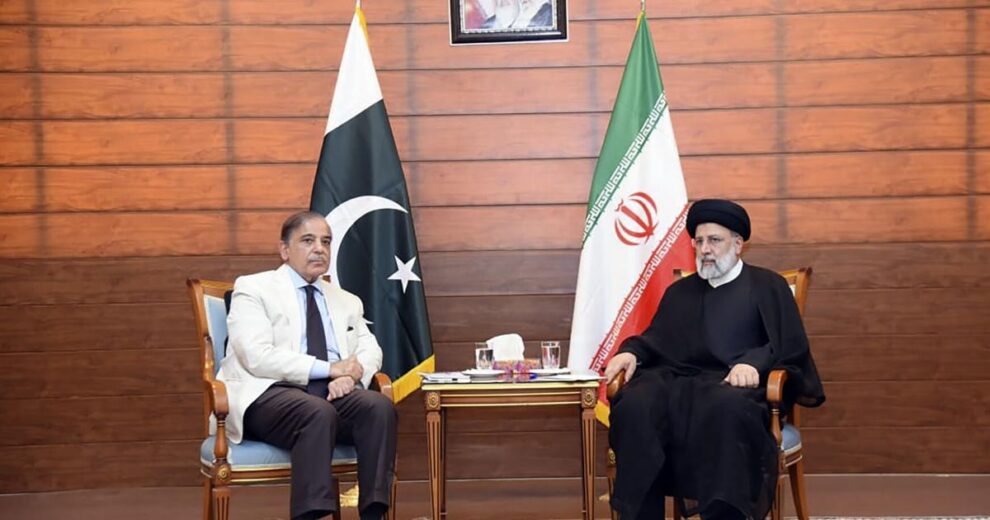Pakistan’s Ministry of Foreign Affairs said the newly inaugurated border market, the Mand-Pishin Border Sustenance Marketplace, is one of the six border markets to be constructed along the Pakistan-Iran border.
In a bid to boost cross-border trade, Pakistan’s Prime Minister Shehbaz Sharif and Iran’s President Ebrahim Raisi inaugurated the first border market at the Mand-Pashin crossing point of the Pakistan-Iran border on Thursday (May 18). The top leaders also launched an electricity transmission line, which will provide some of Pakistan’s remote regions with Iranian-generated electricity.
A statement released on Friday (May 17) by the Ministry of Foreign Affairs of Pakistan said, “The joint inauguration is a manifestation of the strong commitment of Pakistan and Iran to uplift the welfare of residents of the neighbouring provinces of Balochistan and Sistan-o-Baluchestan, respectively. It also serves as a significant stride forward in the bilateral relationship between the two countries.”
The inauguration of the two projects has come at a time when the political landscape of the West Asia region is changing, especially after the China-brokered re-establishment of diplomatic relations between Saudi Arabia and Iran in March this year. With ties between Riyadh and Tehran becoming less tense, the latest development can be seen as an attempt by Islamabad, a close ally of Riyadh, and Tehran to further solidify their bond in order to tackle their ongoing economic crises and improve border security.
What is the new marketplace on the border between Iran-Pakistan?
Pakistan’s Ministry of Foreign Affairs said the newly inaugurated border market, the Mand-Pishin Border Sustenance Marketplace, is one of the six border markets to be constructed along the Pakistan-Iran border. It added that these facilities would enhance cross-border trade, foster economic growth and open up new avenues of opportunity for local businesses.
The latest border market, which is located at Mand town in Pakistan’s Balochistan province and adjacent to Pishin city in Iran’s Sistan-Baluchestan province, has been set up on 10 acres of land. A recent report by The Diplomat noted that trade through the Mand-Pishin border has a long history with Mand being “a hub for small-scale border business owners from across Balochistan, especially those connected with the food and beverage businesses in Kech and Gwadar districts.” It added that the town has several large storage houses, where goods such as food and beverage commodities are imported, stored and then distributed across Balochistan and other provinces of Pakistan.
The decision to open border markets was first taken by the two countries back in April 2021, when they signed a Memorandum of Understanding (MoU) to establish six such facilities. The countries had also agreed to inaugurate the Mand-Pishin border crossing point to boost trade — it was the third border crossing point to be opened along the 959 km-long border between Pakistan and Iran.
At the time, then Adviser to Prime Minister (Pakistan) on Commerce and Investment, Abdul Razzak Dawood, had tweeted, “MOC is pleased to inform that the Memorandum of Understanding (MOU) to establish Border Markets along the border was signed between Pakistan & Iran in April 2021. Three Border Markets are now being established at Gabd, Mund & Chedgi in Balochistan, near our border with Iran.”
It remains unclear if the border markets mentioned by Dawood, who worked for then Prime Minister Imran Khan, became fully functional.
Why have Pakistan and Iran decided to inaugurate the border market now?
The relationship between Shia-majority Iran and Sunni-dominated Pakistan is far from being steady. The two nations have been at odds with each other, especially since the 1979 Islamic Revolution in Iran that brought Ayatollah Khomeini to power.
In recent years, the ties between them further deteriorated due to cross-border attacks by Pakistani militants along their shared border, a report by the Associated Press noted.
“Small separatist groups have been behind a long-running insurgency calling for Baluchistan’s independence from the central government in Islamabad. Pakistani anti-Iran militants have also targeted the Iranian border in recent years, increasing the friction between the two countries.,” it said.
Despite these differences, the two countries haven’t ever completely severed their ties. And now, they seem to be improving their relationship to deal with common issues such as their respective economic crises — Iran’s finances are dwindling due to stringent sanctions imposed by the United States and Pakistan has failed to deal with inflation.
Another reason for their new-found closeness could be the normalisation of ties between Saudi Arabia and Iran. It’s no secret that for decades, Riyadh had been opposed to strong ties between Islamabad and Tehran. However, now that Iran and Saudi Arabia have finally re-established their diplomatic relations, Pakistan can fully cooperate with its neighbour and benefit from it.
Source : Indianexpress















